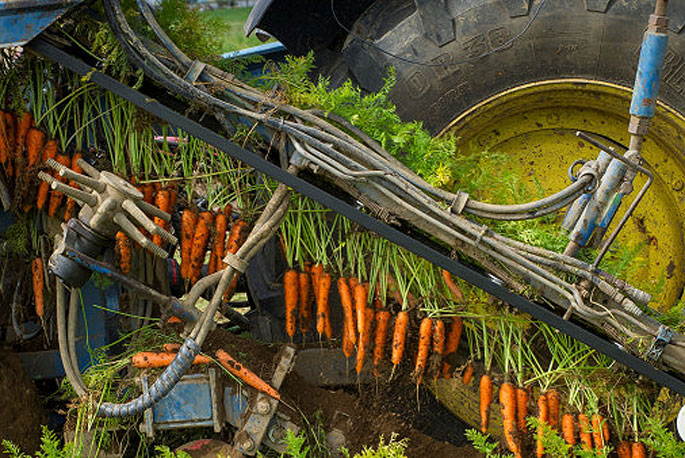Carrots, along with potatoes and onions, are the essential products of Pukekohe-based vegetable grower A S Wilcox.
While this season has faced growers with challenging weather conditions, there are exciting times ahead in which new aspects of the consumer market provide fresh opportunities for growers, according to general manager of growing, Brent Wilcox.
Brent says a 'usual' season - and 2022-23 has been far from 'usual' - the business would grow around 7000 tonnes of carrots, which represents about 15 per cent of Wilcox's overall fresh vege production.
About 90 per cent of the carrot crop goes into the domestic fresh market, with the remainder exported to the Pacific Islands and a smaller quantity going to Asia.
The frost event in October 2022 which hit many growers in the Waikato and Bay of Plenty, didn't impact Wilcox's carrot season greatly, but the rain did, Brent explains.
''We started harvesting Pukekohe spring carrots in October. All through the spring season we had continual rain during October and November, which made getting the carrots out of the ground a struggle.”
Brent shows a printout record of local rainfall, indicating high rain days continuing right through the peak pre-Christmas supply period, which then just continued through January.
By mid-January the region had experienced about twice its usual rainfall - and that was before the Auckland Anniversary Weekend weather bomb that pushed the rain record almost off the chart.
''We've had a much wetter season than usual, which hasn’t had a high impact on our carrot crop quality, but has certainly challenged our ability to harvest and supply customers as we would have liked. We were able to move onto summer crops at Matamata and more latterly into main crop at Ohakune, the mainstay of our winter supply. The wet summer has had some impact on crop condition there, and while current product is satisfactory, if it continues to be wet into the winter it will have further deteriorating effects on quality.
''We are hoping for a cooler, drier, winter to aid holding the quality, and storage in field through until October.''
Meanwhile, on a glorious day in a field near Matamata, A S Wilcox carrots supervisor, Ben Edwards and key operator, Campbell Catchpole, were busy harvesting a 15ha field of carrots.
The planting and harvesting machines are GPS (global positioning system) guided.
''Amazing bits of kit,” Ben says.
When it comes to harvesting, it's all weather-dependent. So time management has become essential to take advantage of windows of opportunity to spray and harvest during the short periods of drier weather.
''The volatility of the weather has challenged maintaining continuity in supply and demonstrates the value in having regional spread of production risk. This volatility, together with significant inflationary pressure on input costs, has had a double whammy impact on the cost of production, as it has with most other product lines.''
The true cost position can change markedly during the year depending on different field performance levels and harvest conditions. The need to maintain fresh washed quality means that crop is stored in the field until just prior to being needed.
So crops destined for the later winter supply period are held for longer and have to withstand a greater risk from weather conditions, Brent says.
With its origins in Pukekohe, A S Wilcox has been around since the 1930s and gradually amassed growing areas in Pukekohe and surrounding locations including Waiuku and Pukekawa. It also grows in Matamata and in Ohakune, which plays a big part in its ability to supply continuity into the market.
Carrots leave the field in 1 tonne bins, and arrive in Wilcox's central packhouse in Pukekohe where they are washed, sorted, and bagged.
While loose carrot sales remain a significant part of the retail market, prepack sales have increased measurably over the last ten years or so.
This has been accentuated in more recent times by buying patterns during the Covid-19 pandemic which boosted packaged lines, Brent says.
Also, consumer preferences are changing and there is a need to cater to developing tastes and expectations with emphasis on continual retail supply.
''Consumers are losing the understanding of produce seasonality. We have traditionally had a more seasonal offering, and this has had to be balanced to manage customer expectations for consistency throughout the year. Increasingly people are shopping for the day - so convenience is king.''
Wilcox actively trials new varieties across their product range and works on innovative product offerings to meet these needs. For example, their ‘Beta Bites’ offer a fresh snacking carrot that tastes great and can be eaten raw with convenience – no prep required.
“As a snacking product that can be eaten straight from the pack, Beta Bites require higher emphasis on sanitary standards that need to be delivered without fail to consumers. This does add some pressure across growing, packaging and distribution systems to continually deliver high quality taste and freshness. However, products like Beta Bites are a growing part of our market and at the end of the day, true to our purpose which is 'To Grow Healthy Communities from the Ground Up’. It's all about encouraging New Zealanders to eat more vegetables.” says Brent.
First published in the July 2023 issue of NZGrower magazine. To read the magazine click here
-Republished with persmission from Horticulture New Zealand.



0 comments
Leave a Comment
You must be logged in to make a comment.